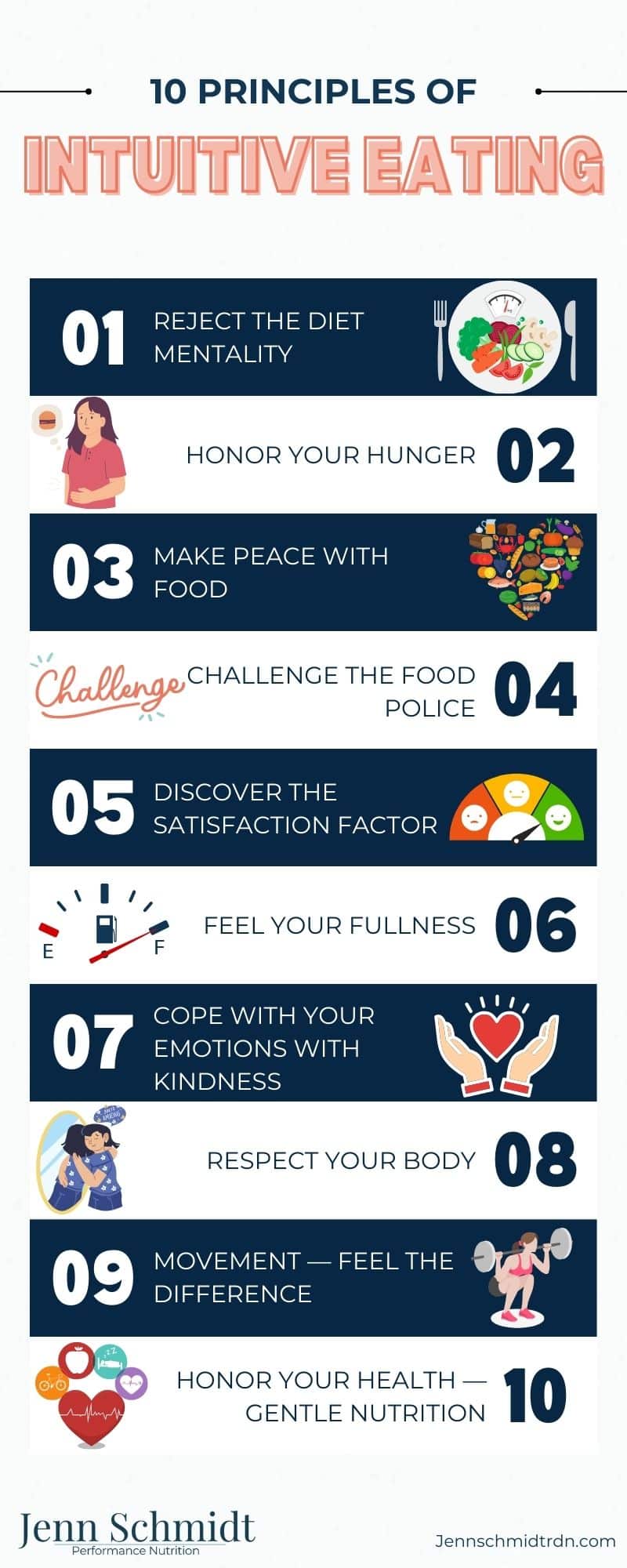Intuitive eating is a concept that challenges traditional dieting norms and encourages individuals to listen to their bodies’ cues when it comes to food and nourishment. Through this practice, people can develop a healthier relationship with food, free from strict rules or restrictions.
In this post, we will explore the 10 principles of intuitive eating that help individuals reconnect with their hunger and fullness signals, promote body acceptance, and live a balanced approach to nutrition and well-being.
Hey, I’m Jenn, a Registered Dietitian who has a passion for helping individuals fuel, think, and move towards the best versions of themselves without sacrificing their relationship with food. If you want practical, evidence-based nutrition advice to improve your performance and wellness — Learn how I can help.
Whether you’re tired of dieting or simply seeking a more compassionate way of relating to food, these principles offer valuable insights into embracing your body’s wisdom and creating sustainable lifestyle changes for optimal health Let’s dive in…
What is intuitive Eating
Intuitive Eating is a non-diet way of eating that prioritizes tuning into your body signals, breaking free from chronic dieting cycles, and healing your relationship with food. It’s about feeling empowered to make choices that honor your hunger, fullness, and satisfaction cues without guilt or shame. It’s a process that can help you develop a healthy relationship with food and your body.
What Are the Benefits of Intuitive Eating
Intuitive eating is more than just a way to achieve food freedom and foster a healthier relationship with food. Many studies have shown that intuitive eating can benefit you physically, mentally, and emotionally..
Here are some of the health outcomes associated with intuitive eating:
- Enhanced cholesterol levels
- Improved body image
- Increased self-esteem
- Improved metabolism
- Lower rates of disordered and emotional eating
- Reduced stress levels
- Greater satisfaction with life
The 10 Principles of Intuitive Eating
Principle 1: Reject the Diet Mentality
It’s hard to escape the barrage of diet culture in our daily lives. Everywhere you look, there are commercials promoting the latest fad diets, social media influencers touting their latest weight loss services, and family members obsessing over their restrictive diets.
Rejecting the diet mentality requires acknowledging and recognizing the influence of diet culture. Once you become mindful of “diet talk,” you’ll be surprised at how frequently you encounter diet ads, articles that promote unhealthy eating habits, and language that glorifies weight loss and restrictive diets.
By recognizing these patterns, you can start to see the harmful lies that led you to believe you were a failure, and stop relying on external cues and start trusting your intuition and body.
Principle 2: Honor Your Hunger
Our ability to recognize hunger and fullness cues is a natural instinct that we are born with. However, external factors such as food rules, restriction, and the influence of others can cause us to lose touch with these internal signals.
Just like you don’t try to suppress breathing, blinking, or your urge to pee, you should not suppress your hunger cues. You should listen to this internal signal to keep your body fed with adequate energy and carbohydrates.
Practice by eating when you’re hungry and give yourself unconditional permission to eat.
By honoring your hunger, you can break the cycle of overeating when your primal hunger strikes. Instead of turning to any available food in distress, you will feel empowered and in control while simultaneously building trust in yourself and your relationship with food.
Principle 3: Make Peace with Food
If you’ve ever denied yourself a specific food (such as bread or pasta), you may have experienced deprivation, which can trigger cravings and overeating resulting in food guilt.. It’s time to give yourself unconditional permission to eat so that you can avoid this vicious cycle and build a balanced relationship with food.
Start by changing your self-talk from “I could never eat this” to “I can eat this.” Take it easy on yourself as you begin to break free from these rules and reject any judgmental or guilt-ridden thoughts.
Principle 4: Challenge the Food Police
Have you ever eaten a donut and felt you were “bad”? Or maybe you had a salad for lunch and felt you were “good”?
If so, you’re no stranger to the food police – that voice that scrutinizes and judges your food choices. The constant reminders of societal food rules can make it difficult to simply enjoy eating as a normal, pleasurable activity. It becomes a moral issue, with every bite being categorized as good or bad, thereby leading to feelings of guilt and shame.
Begin by recognizing the source of the food police voice in your life. Determine whether it’s an internal voice or an external one, such as a partner, family member, social media, or the media. Once you’ve identified where these rules come from, you can start dismantling them. By doing so, you’ll be able to challenge the negative nutrition thoughts and learn to discard them.
Principle 5: Discover the Satisfaction Factor
By granting yourself unconditional permission to eat, you will find pleasure and satisfaction in the foods you eat. No longer will you be deprived of the foods you crave simply because they were once considered off limits.
If you’ve been dieting for a while and have lost touch with what foods you enjoy, you’re not alone. This principle is to help you rediscover what foods satisfy you.
Before you sit down to eat, take a moment to ask yourself if this is the food you desire. Consider whether this food will satisfy you and if there’s anything that can satisfy you even more. Pay attention to the flavors or textures that you want– if they’re not present in your meal, make sure to add them.

Principle 6: Feel your Fullness
This principle of intuitive eating is about achieving physical satisfaction, but to fully embrace this principle, you must have faith in your ability to provide yourself with the foods you desire. Then, you will be able to tune into your body’s cues that indicate you are no longer hungry and look for signs that you are comfortably full.
When you’re eating, take a moment to check in with your body. Ask yourself how the food tastes and what your current hunger level is. Rate your hunger level from 1 to 10, with 1 indicating extreme hunger and 10 indicating feeling stuffed.
Principle 7: Cope with Your Emotions with Kindness
We all go through periods of anxiety, loneliness, boredom, and anger, and occasionally, food serves as a coping mechanism. Food won’t fix any of these feelings. It may comfort, distract, or even numb you for a short period of time but it will not solve the problem.
The main idea behind this principle is to discover alternative methods – ones that don’t involve food – for nurturing, distracting, comforting, and coping with your emotions.
When you’re feeling overwhelmed, it’s essential to have a plan in place. Make a list of activities that help you process your emotions, such as yoga, breathing exercises, reading, or going for a walk.
When you feel the urge to indulge in stress eating, pause and take a moment to reflect. Ask yourself, “What am I feeling, and what do I need?” Then use one of the activities from your list to help you deal with that emotion or situation.
Principle 8: Respect Your Body
While diet and exercise are important factors in determining body shape, genetics also play a significant role. It’s important to recognize that everyone’s genetic makeup is different, and we cannot achieve an unrealistic body for our genetic makeup through diet and exercise.
Improving your self-image begins with self-respect. It’s difficult to reject diet culture if you’re overly critical of your body size or shape.
If the idea of body positivity seems too daunting, try practicing body neutrality. This means accepting your body as it is, appreciating what it does for you, and how it helps you.
Principle 9: Movement — Feel the Difference
Are you only exercising to burn calories? Instead, try shifting your perspective and focus on how it feels to move your body. Engage in activities that make you feel energized and bring you happiness.
There are plenty of ways to stay active that can make you feel strong and energized, such as walking your dog, lifting weights, playing pickleball, swimming, and more. Pay attention to your body’s response when you engage in physical activity and find what you enjoy most.
Remember that you don’t have to commit to a strict exercise regimen to live a healthier lifestyle. If you only have 20 minutes to spare, go for a quick walk instead of feeling like you failed because you didn’t have time for a “full” workout.
Principle 10: Honor Your Health — Gentle Nutrition
Making healthy food choices is essential, but it’s equally important to find pleasure in what you eat to feel content. As a registered dietitian, I’m passionate about the science of nutrition and its ability to nourish our cells, promote physical and mental health, and reduce the risk of and manage chronic illnesses.
Nourishing your body is not about guilt and shame, but a form of self-care that promotes a balanced lifestyle.
You don’t need to consume a perfect diet to stay healthy. One snack, one meal, or one day of indulgence won’t cause nutrient deficiency or affect your health negatively. Rather, it’s your consistent eating habits that matter most. Remember, it’s about progress, not perfection.
Start by building balanced snacks and meals. Start with what your body wants and then add the nutrients that your body needs to feel satisfied and energized.
Final Thoughts
The principles of intuitive eating provide a refreshing and sustainable approach to nourishing our bodies and cultivating a healthy relationship with food.
By rejecting diet culture and embracing self-care, these 10 principles of intuitive eating encourage us to listen to our bodies’ signals of hunger and fullness, honor our cravings without guilt or restriction, and find joy in the act of eating. And by promoting body acceptance and challenging harmful societal norms, intuitive eating empowers individuals to prioritize their well-being over external standards of beauty or thinness.
Incorporating these principles of intuitive eating into our lives can lead not only to improved physical health but also enhanced mental well-being, as we learn to trust ourselves and develop a more harmonious connection with food. Ultimately, intuitive eating offers an alternative path towards long-term health and happiness that emphasizes self-compassion, mindfulness, and self-discovery.
Are you ready to stop stressing about your diet and learn realistic strategies that work? Schedule a free 15 minute call today!
Jenn Fink is a licensed and board-certified Registered Dietitian Nutritionist based in Minnesota. Her goal is to help busy people and families prioritize their health by living a balanced lifestyle and feed their families flavorful meals without spending hours in the kitchen. Jenn is passionate about all things food-related and enjoys making complex science easy to understand for her clients and readers.

